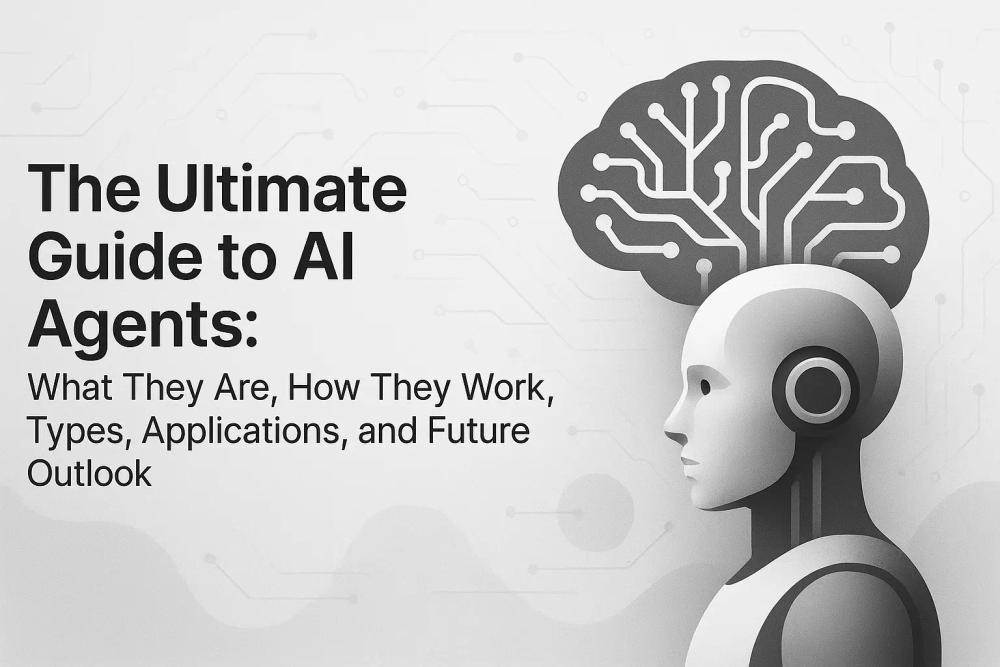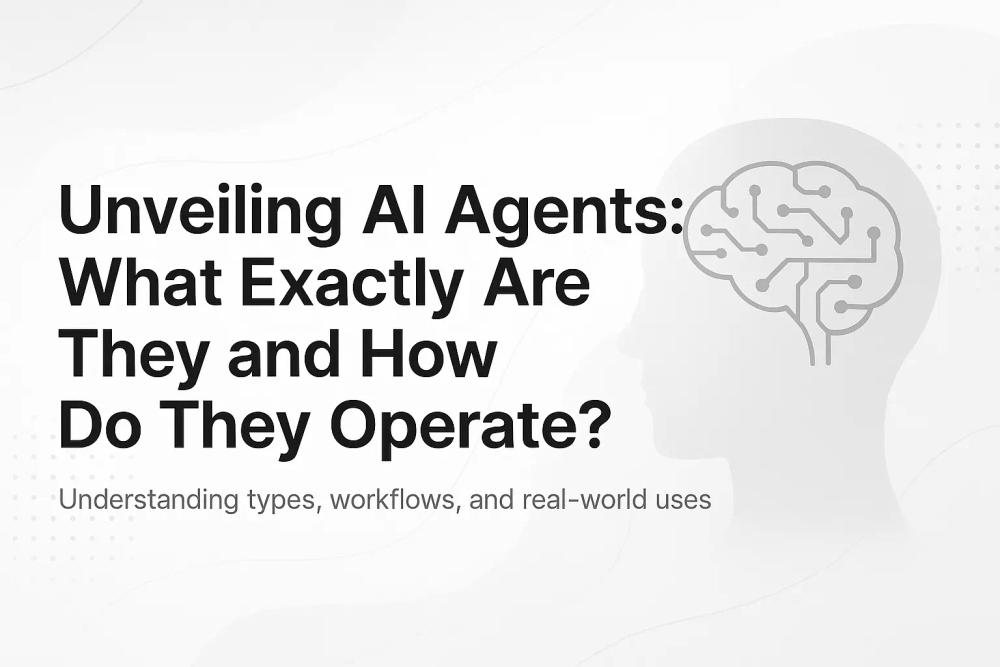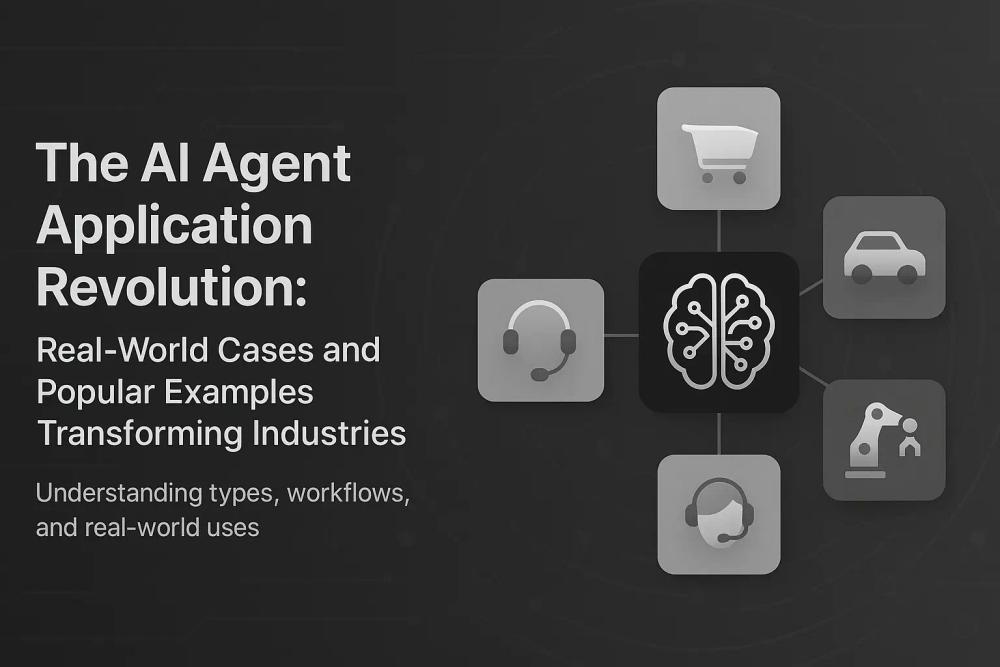
What if you could deploy a team of tireless, intelligent assistants, each designed to perfectly execute a specific task, learn from its experience, and adapt to new challenges? It sounds like the future, but it's happening right now. This is the world of AI Agents.
You've already met them—they are the intelligence behind your virtual assistants, the strategic minds in complex video games, and the unseen engines driving recommendation algorithms. But this is just the tip of the iceberg. AI Agents represent a fundamental shift in how we build software and solve problems, moving from passive tools to proactive partners.
This definitive guide is your central resource for truly understanding AI agents. We won't just skim the surface. We will demystify what they are, explore their inner workings, navigate through their diverse types, witness their real-world impact, and even peek into their exciting future. Whether you're a developer, a business leader, or simply curious about the next wave of technology, you'll leave with the AI agent fundamentals and a clear vision of what's to come. Let's begin.
What is an AI Agent? Defining the Core Concept
At its core, an AI Agent is an autonomous entity that observes its environment through sensors and acts upon that environment through actuators to achieve its goals. Think of it like a digital robot living within a specific context, whether that's a software environment, a game, or even the physical world (in the case of robotics).
Key Components of an AI Agent:
- Environment: The surroundings or context in which the agent operates. This could be a chessboard for a chess-playing agent, the internet for a web-crawling agent, or a factory floor for an automated robotic arm.
- Sensors: The tools an agent uses to perceive its environment (e.g., a camera, microphone, keyboard input, application APIs).
- Actuators: The tools an agent uses to perform actions in its environment (e.g., a robotic arm, a display output, software commands).
- Goals/Tasks: The objectives the agent is designed to achieve.

A common way to describe an agent's task environment is using the PEAS (Performance Measure, Environment, Actuators, Sensors) framework. This helps in clearly defining the agent's scope and purpose. The concept of a rational agent in AI is crucial here; it refers to an agent that always tries to do the right thing, i.e., the action that will maximize its performance measure, given the available information.
AI Agents vs. Traditional Software
While all AI agents are software, not all software programs are AI agents. The key difference lies in autonomy and goal-oriented behavior.
- Traditional Software: Typically follows a predefined set of instructions to perform specific tasks. It's often reactive and doesn't necessarily learn or adapt beyond its programming.
- AI Agents: Possess a degree of autonomy. They can make decisions, learn from experience (in some cases), and adapt their actions to achieve predefined goals, even in changing environments. The "AI Agent vs traditional software" distinction highlights this proactive, goal-driven nature.
Want a more detailed explanation of AI agent definitions, their core components, and how they differ from conventional programs?
Dive deeper into What an AI Agent Is and How It Operates.
How Do AI Agents Work? Unpacking the Mechanics
The workings of an AI Agent can be understood as a continuous loop: perceive, think, and act.
- Perception: The agent gathers information about its current state and the environment through its sensors.
- Thinking/Decision-Making: This is the "brain" of the agent. Based on the perceived information, its internal knowledge base (if any), and its goals, the agent decides what action to take next. This decision-making process can range from simple rule-based logic to complex machine learning models.
- Action: The agent executes the chosen action using its actuators, thereby affecting its environment.
The sophistication of the "thinking" process largely depends on the key technologies behind AI Agents. These often include:
- Machine Learning (ML): Enables agents to learn from data and improve their performance over time without being explicitly programmed for every scenario.
- Natural Language Processing (NLP): Allows agents to understand and generate human language, crucial for conversational agents.
- Knowledge Representation and Reasoning (KRR): Involves creating and using knowledge bases to make informed decisions. This is fundamental for knowledge-based agents.
- Search Algorithms and Planning: Help agents explore possible sequences of actions to find the optimal path to their goal.

The artificial intelligence foundations of computational agents are built upon these technologies, allowing them to exhibit intelligent behavior.
For a comprehensive breakdown of the operational principles, decision-making architectures, and the pivotal technologies that power AI agents, explore our article: Understanding How AI Agents Function.
Types of AI Agents: A Spectrum of Intelligence
AI agents are not a one-size-fits-all solution. They vary greatly in complexity and capability. Here are some of the primary types of AI Agents:
- Simple Reflex Agents: These agents select actions based only on the current percept, ignoring the rest of the percept history. They operate on a simple condition-action rule (if-then).
- Model-Based Reflex Agents: These agents maintain an internal state (a model of the world) to track aspects of the environment that cannot be seen in the current percept. This allows them to handle partially observable environments.
- Goal-Based Agents: In addition to a state model, these agents have goal information. They choose actions that will help them achieve their goals. Search and planning are often involved here.
- Utility-Based Agents: When there are multiple ways to achieve a goal, these agents choose the action that maximizes their expected "utility" or happiness. This is useful when goals are conflicting or uncertain.
- Learning Agents: These agents can learn from their experiences and improve their performance over time. They have a "learning element" that modifies the agent's decision-making capabilities.

Understanding these different types is crucial for selecting or designing the right agent for a specific task.
Curious about the nuances between these agent types, their specific architectures, and when to use each?
Read our detailed exploration: Exploring the Diverse Types of AI Agents.
AI Agents in Action: Real-World Applications and Examples
The practical applications of AI Agents span nearly every industry, showcasing their versatility and power. Here are a few key areas where they are making a significant impact:
- Customer Service: Chatbots and virtual assistants (intelligent virtual agents) handle customer queries, provide support, and guide users, improving efficiency and user experience.
- Marketing Automation: AI agents personalize marketing campaigns, analyze customer behavior, and automate repetitive tasks.
- Software Development: AI agents can assist in code generation, automated testing, and even bug fixing.
- Healthcare: From diagnostic assistance and robotic surgery to personalized treatment plans and drug discovery, AI agents are revolutionizing patient care.
- E-commerce: Recommendation engines, personalized shopping experiences, and dynamic pricing are often powered by AI agents.
- Finance: Algorithmic trading, fraud detection, and risk assessment.
- Autonomous Vehicles: Self-driving cars are a prime example of complex AI agents perceiving and navigating the real world.
- Robotics: Industrial robots performing tasks in manufacturing, logistics, and exploration.

Examples like Google Assistant, Amazon's Alexa, and various industry-specific AI agents examples demonstrate their growing integration into our daily lives and business operations.
To see how AI agents are transforming various sectors with concrete examples and case studies, check out: Practical Applications and Examples of AI Agents Across Industries.
Building AI Agents: Tools and Considerations
The prospect to build AI Agent solutions is becoming increasingly accessible thanks to advancements in AI development tools and platforms. While creating a sophisticated AI agent is a complex undertaking, several frameworks and libraries simplify the process.
Key considerations when building an AI agent include:
- Defining the Goal and Scope: Clearly understanding what the agent needs to achieve.
- Choosing the Right Agent Architecture: Selecting from the types mentioned earlier (simple reflex, model-based, learning, etc.) based on the task complexity.
- Selecting Tools and Technologies: Programming languages like Python, along with libraries such as TensorFlow, PyTorch, scikit-learn, and specialized agent development frameworks (e.g., LangChain, AutoGen for LLM-based agents).
- Data Collection and Training: For learning agents, high-quality data is essential for training effective models.
- Testing and Evaluation: Rigorously testing the agent's performance in various scenarios.

Interested in the development process?
Find out more about the tools, techniques, and steps involved in Building Your Own AI Agent: Tools and Techniques.
The Future of AI Agents: Trends and Possibilities
The future of AI Agents is incredibly promising, with ongoing research pushing the boundaries of what's possible. We can expect to see:
- Increased Autonomy and Adaptability: Agents will become even better at making decisions and adapting to new, unseen situations without human intervention.
- Enhanced Human-Agent Collaboration: AI agents will work more seamlessly alongside humans, augmenting our capabilities in various tasks.
- More Sophisticated Multi-Agent Systems: Complex tasks will be tackled by teams of collaborating AI agents, each specializing in different aspects.
- Advancements in Explainable AI (XAI): As agents become more complex, there will be a greater need to understand how they arrive at their decisions, leading to more transparent and trustworthy AI.
- Ethical Considerations: As AI agents become more powerful and integrated into society, addressing ethical implications, bias, and control will be paramount.
- Towards Artificial General Intelligence (AGI): While still a long-term vision, the development of agents that can understand, learn, and apply knowledge across a wide range of tasks, much like humans, remains a significant goal in the field.

The journey of AI agents is just beginning, and their evolution will undoubtedly continue to shape our future in profound ways.
Conclusion: Embracing the AI Agent Revolution
AI agents represent a pivotal advancement in artificial intelligence, moving beyond mere automation to intelligent action and decision-making. From the foundational concepts of what an AI Agent is and how it operates, to the diverse types and their far-reaching applications, it's clear that these intelligent entities are set to redefine industries and enhance human capabilities.
By understanding the core principles, recognizing the different agent architectures, exploring their real-world impact, and even considering how they are built, we can better prepare for and contribute to this evolving technological landscape. The future of AI Agents promises even more sophisticated and integrated solutions, making this an exciting and critical field to watch.
We hope this ultimate guide has provided you with a solid understanding of AI agents and their significance. We encourage you to explore the linked articles for deeper insights into specific aspects of this fascinating domain.
For those wishing to delve deeper into ongoing research and the latest breakthroughs in artificial intelligence, the following resources are highly recommended:
- OpenAI Blog: For insights into their latest research, projects, and discussions on AI safety and advancements. (https://openai.com/blog/)
- Google DeepMind Blog: Discover their latest AI breakthroughs, projects, and updates from one of the leading AI research labs. (https://deepmind.google/discover/blog/)
- Stanford Artificial Intelligence Laboratory (SAIL): Explore publications and news from a leading academic research institution in AI. (https://ai.stanford.edu/)
- MIT Computer Science and Artificial Intelligence Laboratory (CSAIL): Stay updated with news and research from another world-renowned academic lab. (https://www.csail.mit.edu/)
- Association for the Advancement of Artificial Intelligence (AAAI): A premier scientific society dedicated to advancing AI, offering publications, conferences, and resources like AI Magazine. (https://aaai.org/)
- Journal of Artificial Intelligence Research (JAIR): An open-access scientific journal publishing significant research across all areas of AI. (https://www.jair.org/)
These links should provide valuable avenues for further exploration and staying current with the rapidly evolving field of Artificial Intelligence.




